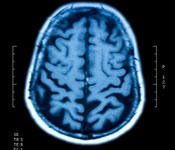Neuroimaging
 Today's physicians and scientists have come to rely on increasingly detailed images of the brain's structure and function to better understand, diagnose and treat neurodegenerative diseases and cognitive changes associated with aging.
Today's physicians and scientists have come to rely on increasingly detailed images of the brain's structure and function to better understand, diagnose and treat neurodegenerative diseases and cognitive changes associated with aging.
UC Davis Department of Neurology faculty members who are part of the IDeA Lab are working to reveal the biological basis of diseases of the aging brain, as well as to improve the imaging techniques used to visualize the workings of both normal and diseased brains.
Located in the Center for Neuroscience, the IDeA Lab uses a variety of state-of-the-art imaging techniques, including:
- PET (positron emission tomography)
- SPECT (single photon emission computed tomography)
- MRI (magnetic resonance imaging)
- fMRI (functional magnetic resonance imaging)
The lab uses these techniques to investigate everything from improving the diagnosis of non-Alzheimer’s dementia to discovering biological markers that characterize the transition from mild cognitive impairment to the onset of Alzheimer’s disease.
